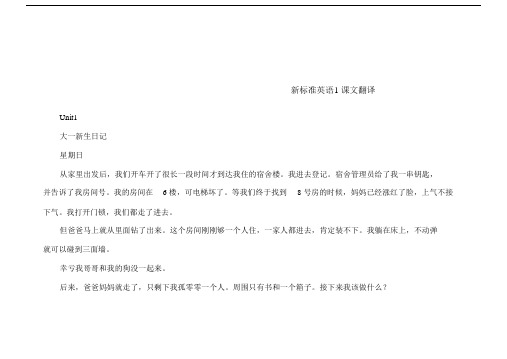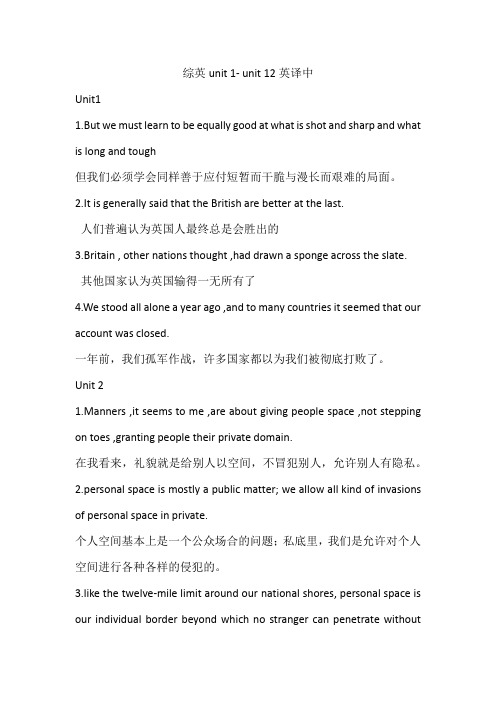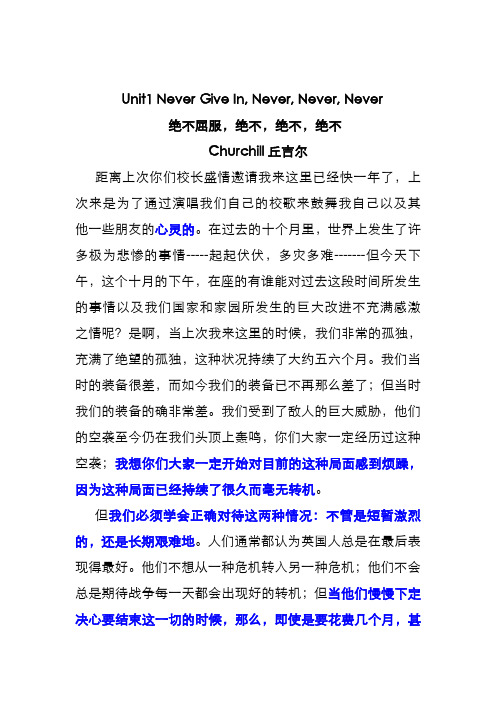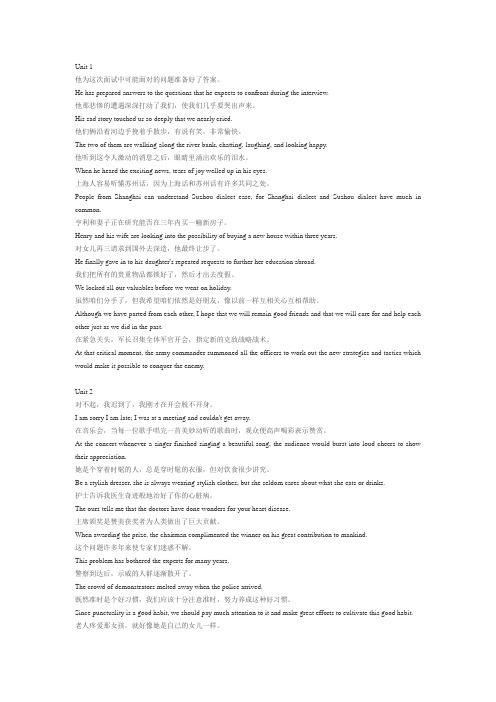综英UNIT1
新标准大学英语综合教程1课文翻译

新标准英语1课文翻译Unit1大一新生日记星期日从家里出发后,我们开车开了很长一段时间才到达我住的宿舍楼。
我进去登记。
宿舍管理员给了我一串钥匙,并告诉了我房间号。
我的房间在6楼,可电梯坏了。
等我们终于找到8号房的时候,妈妈已经涨红了脸,上气不接下气。
我打开门锁,我们都走了进去。
但爸爸马上就从里面钻了出来。
这个房间刚刚够一个人住,一家人都进去,肯定装不下。
我躺在床上,不动弹就可以碰到三面墙。
幸亏我哥哥和我的狗没一起来。
后来,爸爸妈妈就走了,只剩下我孤零零一个人。
周围只有书和一个箱子。
接下来我该做什么?星期一早上,有一个为一年级新生举办的咖啡早茶会。
我见到了我的导师,他个子高高的,肩膀厚实,好像打定了主意要逗人开心。
“你是从很远的地方来的吗?”他问我。
他边说话边晃悠脑袋,咖啡都洒到杯托里了。
“我家离爱丁堡不太远,开车大约6个小时,”我说。
“好极了!”他说,接着又走向站在我旁边的那个女孩儿。
“你是从很远的地方来的吗?”他问。
但不等那女孩儿作出任何回答,他就说到,“好极了!”然后就继续向前走。
他啜了一口咖啡,却惊讶地发现杯子是空的。
妈妈打来电话。
她问我是不是见到了导师。
星期二我觉得有点儿饿,这才意识到我已经两天没吃东西了。
我下楼去,得知一天三餐我可以在餐厅里吃。
我下到餐厅排进了长队。
“早餐吃什么?”我问前面的男生。
“不知道。
我来得太晚了,吃不上早餐了。
这是午餐。
”午餐是自助餐,今天的菜谱是鸡肉、米饭、土豆、沙拉、蔬菜、奶酪、酸奶和水果。
前面的男生每样儿都取一些放到托盘上,付了钱,坐下来吃。
我再也不觉得饿了。
妈妈打电话来。
她问我有没有好好吃饭。
星期三早上9点钟我要去听一个讲座。
我醒时已经8:45了。
竟然没有人叫我起床。
奇怪。
我穿好衣服,急匆匆地赶到大讲堂。
我在一个睡眼惺忪的女生旁边坐下。
她看了看我,问:“刚起床?”她是怎么看出来的?讲座进行了1个小时。
结束时我看了看笔记,我根本就看不懂自己写的字。
那个女生名叫苏菲,和我一样,也是英语文学专业的学生。
unit 1.等综英翻译

1.For some, it was a matter of geography-not just which tower they worked in or on which floor, but in which corner of the building.对有些人来说,生死攸关的是此时此刻他们所在的位置——不仅是哪幢楼,哪一层,更重要的是大楼的哪个角落。
2.In the noise, smoke and sparks, Mayblum didn’t realize that his friend Hong Zhu was behind him in the stairwell the whole time.周围噪声震耳,烟雾弥漫,梅布勒姆没有意识到,他的朋友朱虹始终就在他身后的楼梯井里.3.Piece by piece, she developed a picture of his escape. Harry was on 87 when the plane hit. 她一点一点地拼出了哈里逃生的场景:飞机撞击时,他正在第87层楼。
4.But as hard as she tried, as many questions as she asked, the picture began to fade on the 36th floor.但是,尽管她绞尽了脑汁,问了无数问题,她拼出的场景还是在第36层上逐渐模糊了。
1.5.那部关于古代战争的电影采用了先进的技术,令观众仿佛身临其境。
(illusion)with advanced technology, that movie about ancient war give the audiences an illusion of being present.6.在那场大火中,整个古城毁于一旦,但是这块石碑去幸运的保存了下(devastate)That ancient city was devastated by the fire, but fortunately the stone table survived.7.他们看了那段录像,听了那位妇女的讲述,心中充满了对那位地震孤儿的同情。
综英 unit1-unit12 英译中 终结版

综英unit 1- unit 12英译中Unit11.But we must learn to be equally good at what is shot and sharp and what is long and tough但我们必须学会同样善于应付短暂而干脆与漫长而艰难的局面。
2.It is generally said that the British are better at the last.人们普遍认为英国人最终总是会胜出的3.Britain , other nations thought ,had drawn a sponge across the slate.其他国家认为英国输得一无所有了4.We stood all alone a year ago ,and to many countries it seemed that our account was closed.一年前,我们孤军作战,许多国家都以为我们被彻底打败了。
Unit 21.Manners ,it seems to me ,are about giving people space ,not stepping on toes ,granting people their private domain.在我看来,礼貌就是给别人以空间,不冒犯别人,允许别人有隐私。
2.personal space is mostly a public matter; we allow all kind of invasions of personal space in private.个人空间基本上是一个公众场合的问题;私底里,我们是允许对个人空间进行各种各样的侵犯的。
3.like the twelve-mile limit around our national shores, personal space is our individual border beyond which no stranger can penetrate withoutmaking us uneasy.就像我们国家拥有12海里领海权一样,个人空间就是我们的边界,只要有陌生人穿过这个边界就会使我们感到不安。
综英4 unit 1 课文译文

Unit1 Never Give In, Never, Never, Never绝不屈服,绝不,绝不,绝不Churchill丘吉尔距离上次你们校长盛情邀请我来这里已经快一年了,上次来是为了通过演唱我们自己的校歌来鼓舞我自己以及其他一些朋友的心灵的。
在过去的十个月里,世界上发生了许多极为悲惨的事情-----起起伏伏,多灾多难-------但今天下午,这个十月的下午,在座的有谁能对过去这段时间所发生的事情以及我们国家和家园所发生的巨大改进不充满感激之情呢?是啊,当上次我来这里的时候,我们非常的孤独,充满了绝望的孤独,这种状况持续了大约五六个月。
我们当时的装备很差,而如今我们的装备已不再那么差了;但当时我们的装备的确非常差。
我们受到了敌人的巨大威胁,他们的空袭至今仍在我们头顶上轰鸣,你们大家一定经历过这种空袭;我想你们大家一定开始对目前的这种局面感到烦躁,因为这种局面已经持续了很久而毫无转机。
但我们必须学会正确对待这两种情况:不管是短暂激烈的,还是长期艰难地。
人们通常都认为英国人总是在最后表现得最好。
他们不想从一种危机转入另一种危机;他们不会总是期待战争每一天都会出现好的转机;但当他们慢慢下定决心要结束这一切的时候,那么,即使是要花费几个月,甚至数年的时间,他们也会做的。
让我们把思绪拉回到十个月之前我们在此相遇的情景,然后再转到现在。
另外一个我想我们可以吸取的教训是,表面的东西往往具有欺骗性。
正如吉普林所说的,我们必须“去面对胜利和灾难,并对这两种具有欺骗性的东西保持同样的态度。
”你很难从事情的表面判断它的走势。
尽管离开了想象力就做不了多少事情,但想象有时候会让事情看起来比实际情况更糟。
那些富有想象力的人会发现很多也许根本就不存在的危险;也许会有更多的危险发生,但这些人同时也要祈求能被赐予额外的勇气来承受这种深远的想象力。
但对所有人来说,毫无疑问,我们在这段时期所经历的-------我要告诉你们--------从这10个月的经历中所得到的经验就是:绝不屈服,绝不屈服,绝不,绝不,绝不,绝不------屈服于任何东西,不管它是伟大还是渺小,庞大还是细微-------除了对荣誉和机智外,都绝不屈服。
【综英I】Unit 1 Half a day (for sts)--sentence explanation

Lesson 1 – Half a Day
More examples
1. The moment I saw him, I recognized he
was the criminal the police were looking for. 2. The year I was born, my father was working towards a PhD degree. 3. The day Hans Christian Andersen
My mother stood at the window watching our slow and difficult movement towards the school, and I looked back at her frequently, hoping she would stop my father taking me to school.
Text Analysis
Detailed Analysis
Sentence Paraphrase
I did not believe there was really any good to be had in
tearing me away from my home and throwing me into
what he was driving at. 5. The words immediately set us
all laughing.
Text Analysis
Detailed Analysis
Part I: Words & Expressions
Words Phrases Sentence Pattern Grammar
新编英语教程综英第三版unit1

LANGUAGE STRUCTURESPRACTICE IExampleA: Oh dear! My pupils’homework is full of careless mistakes.B: Did you tell them to check their homework before they hand it in?A: No, I didn’t.B: I think they should be told that their homework has to be checked before they hand it in. PRACTICE IIExampleA: Lilian’s been working very hard, I was told.B: Yes, so I heard. She often works overtime.A: Is she paid anything extra for overtime?B: No, she isn’t.PRACTICE III AExampleA: Poor Tom! Lots of people make fun of him.B: Why do they do that?A: Because he walks with a limp.B: Well, I don’t think anybody should be made fun of because of his physical handicap. PRACTICE III BExampleA: How was the exhibition?B: Very good.A: Were brochures handed out to visitors?B: Oh, yes, they were.PRACTICE IVExampleA: People say the city has mapped out a construction plan for the next year.B: Has it? Do you know any particulars?A: Yes. They say that three parks will be expanded.B: Good. We’ll have more space for enjoyment and rest.DIALOGUEThe Olympic GamesA: Hi, Mark!B: Hi, Jessie, nice to see you! Why are you looking so worried?A: I’m writing an essay on the Olympic Games, but, you know, I know very little about them. It is said that you are an Olympic expert, so could you please give me some help?B: No problem! What do you want to know?A: I only know the ancient Olympic Games originated in Athens. Could you tell me something about them?B: Well, the ancient Olympic Games were a series of competitions held between representatives of several Greek city-states and kingdoms, which featured mainly athletic but also combat and chariot racing events.A: I hear the origin of the Olympics is shrouded in mystery and legend.B: It is. One of the most popular myths identifies Heracles and his father Zeus as the progenitors of the Games. According to legend, it was Heracles who first called the Games “Olympic”and established the custom of holding them every four years.A: When were the first Olympic Games held?B: In 776 BC. The Games reached their zenith in the 6th and 5th centuries BC, but then gradually declined after the Roman Empire came to dominate ancient Greece. They were abolished in 393 AD.A: What a pity! When did they begin to revive?B: Not until about 1,500 years later, when a young French educator, Baron Pierre de Coubertin, proposed that the ancient Games be revived on an international scale.A: His attempt at reviving the Games must have been warmly welcomed.B: No. In fact, his attempt was not met with much enthusiasm. Still, he persisted.A: So when and where were the first modern Olympic Games held?B: They were held in Athens in 1896, with 241 athletes from 14 nations competing in 43 events.A: And now the Games have grown to more than 10,000 competitors from over 200 countries. They’ve really developed.B: They have.A: I know the Olympic Games are held in a different city each time. But who is responsible for choosing the host city?B: The International Olympic Committee is responsible for that, as well as overseeing the planning of the Olympic Games, and updating and approving the sports program.A: You really do know a lot about the Olympic Games. Thank you so much for your help!B: It’s a pleasure.LISTENING IN & SPEAKING OUTPopular Sports in BritainSports play an important part in the life in Britain and they are popular leisure activities.Whether spectating or participating, British people are well-known for their love of sports.Wherever you are, you’re never far from the action and the options are huge. There’s a non-stop calendar of events with many sports played in summer or winter. It’s no wonder manyBritish people think in sporting seasons rather than years.The United Kingdom has given birth to a range of major international sports including: football, rugby, cricket, golf, tennis, badminton, squash, hockey, boxing, snooker, billiards and curling. It has also played a key role in the development of sports such as Sailing and Formula One.Football is undoubtedly the most popular sport in England, and has been played for hundreds of years. In the English Football League there are 92 professional clubs. These are semi-professional, so most players have other full-time jobs. Hundreds of thousands of people also play football in parks and playgrounds just for fun. The highlight of the English football year is the FA (Football Association) Cup Final each May. The beautiful game is not only a sport in Britain but a way of life. Players like England ace David Beckham have turned heads all over the world and made teams like Manchester United and Arsenal household names.Rugby is similar to football, but played with an oval ball. Players can carry the ball and tackle each other. The best rugby teams compete in the Super League Final each September. For many years rugby was only played by the rich upper classes, but now it is popular all over the country.The world’s most famous tennis tournament is Wimbledon. It started at a small club in south London in the 19th century. It begins on the nearest Monday to June 22, at a time when the English often have the finest weather. Millions of people watch the Championships on TV live. It is traditional for visitors to eat strawberries and cream whilst they watch the tennis.Horse racing, the sport of kings, is a very popular sport with meetings being held every day throughout the year. The Derby originated here, as did The Grand National which is the hardest horse race in the world. Horse racing and greyhound racing are popular spectator sports. People can place bets on the races at legal off-track betting shops.READING ITwo Kinds of FootballAmerican football, not to be confused with the football called soccer, is the American national sport. It developed from the British game of rugby and, although it is played in no other country in the world (except Canada), it excites tremendous enthusiasm. Intercollegiate games (games between universities) are great social occasions. More than 100,000 mothers and fathers, brothers and sisters, students and football fans from the general public, crowd into the huge, luxurious stadiums. During a recent college final in the Rose Bowl at Pasadena, California, there were severe earthquake tremors, but nobody noticed!The method of scoring in American football is the same as in rugby. Players try to carry the ball over the opponents’line, and then to earn more points by kicking the ball between the upright goal posts above the bar. But that is where the likeness between the two games ends.American football has a reputation for being a brutal and dangerous game. This reputation is not really deserved. The players hurl themselves at each other fiercely, but today their uniforms and helmets (fitted with visors to protect their faces) are so skilfully padded that there are few serious injuries. By comparison, the rugby player is almost naked, having only a thin jersey and a pair of shorts to protect him from his opponents’boots and tackling.The Americans are addicted to crazes. When they take something up, they do so wholeheartedly, and often the rest of the world follows their lead. Jogging is an example of this. The Americans now have another craze, a game which most other countries call “football,”but which they call soccer. Soccer is spreading like wildfire through all the States and gaining in popularity on baseball. It is being run by big business and TV advertisers, who are doing everything they can to sell it to the public. They are employing famous fashion designers to design novel uniforms for the players. They have introduced a musical background to the games, and there is a big screen in the stadium which explains to spectators what is happening. Most important, they have hired, at enormous expense, famous coaches and players from Europe and South America. They have also changed some of the rules, including the offside rules to make the game more exciting.Soccer games can now draw crowds of over 70,000 in cities where baseball attracts a mere20,000 spectators. The soccer stadiums are much more luxurious than the vast majority of European and South American league grounds. There is a seat for everyone and a parking lot for 25,000 cars.Soccer is being brilliantly promoted, like any other promising American product.READING IIThe Physical Miseducation of a Former Fat BoyWhen I was six, a next-door neighbor gave me my first candy bar, and I fattened immediately in a home where food was love. It is hardly surprising that when I first entered physical education courses in the eighth grade my coaches were markedly unimpressed or that thereafter I compensated by working harder at books, where I was more successful. Although I did learn to take jokes about my size and experienced the “bigness”of being able to laugh at myself (the standard fat man’s reward), at thirty-five I am furious to recall how readily and completely my instructors defaulted in their responsibilities to me. Some remedies I have learned in my thirties persuade me that it is not inevitable that the system will continue to fail other fat boys.My personal remedies for physical ineptitude have a firm base in ideas. Four years ago I weighed 265 pounds. Only my analyst needs to know how much I consequently hated myself. In six months I took off 105 pounds and initiated a regular jogging and exercising schedule that has gradually, very gradually, led to increased self-confidence. Yet my physical education teachers in secondary school and college never showed the least interest in my physical problems, never sat down and initiated the simplest diagnosis of my physical needs, never tempted me into thepersonal discoveries that I have to wait more than a decade to make for myself.Instead, my physical educators offered two alternatives. Either I could enter the fierce competitive sports that predominate in our culture and therein make and accept the highest mark I could achieve; or I could opt for the less-competitive intramurals, modeled after the big boys’games, and accept my role as a physically incompetent human being, sitting on the sidelines to cheer for a chosen team of professionals. These limited alternatives were repeatedly justified as teaching me how it is out in the “real world,”in “the game of life,”allegedly divided between the participators and the watchers.Now, as I jog in my midwinter dawn, all muffled with socks over my hands, making tracks with the rabbits in Carolina dew, I am not competing with anyone, unless I whimsically imagine Father Time having to add another leaf to my book. I am celebrating me, this morning, this pair of wornout tennis shoes, the tingle in my cheeks, the space being cleared in my stomach for my simple breakfast when I get back…I was very articulate at fourteen —fat by articulate —and I believe that a sympathetic, interested coach could have shared this type of insight, this type of reality, with me, and perhaps thereby he could have teased me into the discoveries I had to take many years later.But the coach would have had to love kids like me more than he loved winning if he had hoped to participate in my physical education. I had no such coach.My physical educators were signally unimaginative. We played only the few sports that had always been played in our area. Further, they maintained a rigid separation between “sports”and “play.”Football, baseball, basketball, and track were “sports.”Fishing, hiking, boating, and jogging were “play.”Golf was “play”until you had a team that won five trophies; then you developed the cool rhetoric of “sport.”。
综英一册Unit 1-9的translation

Unit 1他为这次面试中可能面对的问题准备好了答案。
He has prepared answers to the questions that he expects to confront during the interview.他那悲惨的遭遇深深打动了我们,使我们几乎要哭出声来。
His sad story touched us so deeply that we nearly cried.他们俩沿着河边手挽着手散步,有说有笑,非常愉快。
The two of them are walking along the river bank, chatting, laughing, and looking happy.他听到这令人激动的消息之后,眼睛里涌出欢乐的泪水。
When he heard the exciting news, tears of joy welled up in his eyes.上海人容易听懂苏州话,因为上海话和苏州话有许多共同之处。
People from Shanghai can understand Suzhou dialect ease, for Shanghai dialect and Suzhou dialect have much in common.亨利和妻子正在研究能否在三年内买一幢新房子。
Henry and his wife are looking into the possibility of buying a new house within three years.对女儿再三请求到国外去深造,他最终让步了。
He finally gave in to his daughter's repeated requests to further her education abroad.我们把所有的贵重物品都锁好了,然后才出去度假。
We locked all our valuables before we went on holiday.虽然咱们分手了,但我希望咱们依然是好朋友,像以前一样互相关心互相帮助。
新编实用英语综合教程1第四版Unit1

Imitating Mini-Talks
1 Work in pairs. Practice the following mini-talks about greeting and introducing people.
Window on Key Words
1) Meeting People for the First Time A: Hello, Mr. David Green! I'm Lily Zhang. B: Hi, Miss Zhang! Nice to meet you. A: Nice to meet you, too. Mr. Green. B: Oh, please call me David.
_g_e_n_e_r_a_l _m__an__a_g_e_r _. Mr. Smith: And you may also know I'm a lover of Chinese food! 5 (给名片)
__H_e_r_e_i_s_m__y_c_a_r_d_____.
Unit | One
6 Imagine you are a new employee (雇员) at a joint venture (合资企业). Mr. Smith is the general manager there. You meet him for the first time at the company's canteen (餐厅). Fill in the blanks according to the clues (提示) given in the brackets. Then act it out with your partner.
My major is marketing. Mr. Smith: Very good. 3 (表示欢迎) _W__e_lc_o_m__e__to__o_u_r_c_o_m__p_a_n_y__.
- 1、下载文档前请自行甄别文档内容的完整性,平台不提供额外的编辑、内容补充、找答案等附加服务。
- 2、"仅部分预览"的文档,不可在线预览部分如存在完整性等问题,可反馈申请退款(可完整预览的文档不适用该条件!)。
- 3、如文档侵犯您的权益,请联系客服反馈,我们会尽快为您处理(人工客服工作时间:9:00-18:30)。
Unit 1
Never Give In, Never, Never, Never
I. Text Analysis The text is an inspiring speech made by Winston Churchill, great Britain’s ex-Prime Minister and famous orator, when he visited Harrow School on October 29, 1941. Part 1 (Para. 1)the summary about the events that had happened in the world with Great Britain in particular and then talked about the purpose of his visit - to encourage the whole nation to fight against the Nazis. Part 2 (Paras. 2 –5) is the body of the speech in which he analyzed the world situation and how other
countries looked at Britain and then called on the British people not to give in. Part 3 (Paras. 6 – 8) is the closing remarks in which, by changing a word in the additional verse of the school song, he expressed his conviction that this nation was determined to fight for the victory of this great war. II. Important details Q1.What was the intention of Churchill’s singing some of their songs? At the initial stage of the WWII, Great Britain was fighting in isolation against Nazi Fascists. Some
* Spelling mistakes forth –fourth (and so forth) discipline; * Collocation spend time to do something (doing) spend money on books commit a crime ** solution to the problems – dictation Cultivate the good quality of acting on our initiative in study world word (pronunciation)
be, and we should not feel discouraged. The massive air force of Nazi Fascists was strong in appearance, but it could be defeated sooner or later. Q3. Why did Churchill replace the word “darker” with “sterner”? Because he had a strong conviction of victory. The word “darker” carries a pessimistic tone, for it indicates “a period of unpleasant and frightening time” and implies hopelessness in a difficult period. But the word “sterner”, although it has the identical referent, suggests the bright side of the situation and shows Churchill’s optimistic view. By changing the word, Churchill wanted to convey to the British people the
message that although there were still great difficulties ahead, Great Britain would prevail in the end. III. Language Work (revision and new arrivals) Revision: find out as more as possible set phrases from the text. New phrases: 1. Ups and downs – a mixture of good things and bad things Sitting beside the window, he recalled the ups and downs of his parenthood. The company has experienced its ups and downs since it was founded.
British people doubted whether their nation could win the war with their own efforts. Churchill wanted to convey the conviction of the government to the British people through those songs and encourage them not to give in. Q2. Why did Churchill quote Kipling as saying “treat those two impostors just the same”? Because he tried to enlighten the British people from another perspective by implying that they should treat triumphs and disasters of the war in the same way. Sometimes triumphs were just overt phenomena, which could mislead people to a wrong conception and disasters were not as frightening as they seemed to
ቤተ መጻሕፍቲ ባይዱ
Points for Attention 1. Result of last final exam Passed rates: 87.4% Average points: 71/100 2. Problems to be solved * Predicates; eg. As far as I am concerned … To be a better student includes … Don’t be afraid of /to … I should be eager to learn …
6. …our account was closed…-- …completely defeated… 7. … our country stood in the gap. …-- our country shoulder the responsibility in isolation. At the critical moment of world economic recession, a powerful government is needed to stand in the gap. 8. … we have only to persevere to conquer… -- we have no choice but to hold on until victory comes. 9. …each of us according to our stations. -- each of us according to our social positions.
2. What is short and sharp and what is long and tough – difficulties and hardships of any kind, imminent or distant, temporary or long-lasting 3. Throwing our minds back to our meeting here ten months ago – recalling Please throw back your minds back to 1945, when people all over the world were engaged in a great and cruel war against the Fascists. 4. Appearances are often very deceptive – surface phenomena tend to be misleading 5. Imagination makes things out far worse – what one imagines tends to be worse than reality
